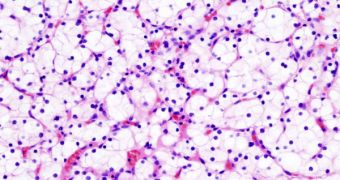New human clinical tests have revealed that the new drug, TroVax®, shows great potential in reversing the effects of solid tumors in patients suffering from colorectal, kidney or prostate cancer. The medicine works by inciting a strong immune response in the patient's body, which, in turn, binds to the tumors and annihilates them. Researchers at Oxford BioMedica, the company behind this drug, say their product offers cancer sufferers more survivability odds than other products currently available.
Modified Vaccinia Ankara (MVA) is the active component of the new medicine. MVA is a modified virus strain that can be used both as a means of transport for other substances, as well as an "adjuvant," ensuring that the binding between the substance it carries and the immune system happens correctly, thus triggering the strongest response possible. During the tests, TroVax® was loaded with a gene that produces an antigen "indigenous" to solid tumors, called 5T4.
"Antibody and cellular responses can occur in response to both the viral vector (MVA) and to the 5T4 antigen," explains Dr Richard Harrop, vice president of clinical immunology at the manufacturing company, Oxford BioMedica. Out of the 180 patients injected with the drug in both the United States and the United Kingdom, 88 percent showed responses to 5T4 and 98 percent to MVA.
"When looking at the results from all the trials (colorectal, renal and prostate cancer patients), the magnitude of the 5T4-specific antibody response was associated with increased patient survival. Indeed, a doubling of the average number of antibodies in the patients between the first and third injections was associated with a reduction in the relative risk of death of 17%. This effect was strongest in colorectal cancer patients," Harrop explained.
The refinement of this medicine could lead to novel ways of treating the three types of cancer. Combinations with other anti-cancerous therapies also proved effective, so the way is clear for a cocktail of therapies aimed at completely reducing cancerous cell incidence inside hard tumors.

 14 DAY TRIAL //
14 DAY TRIAL //